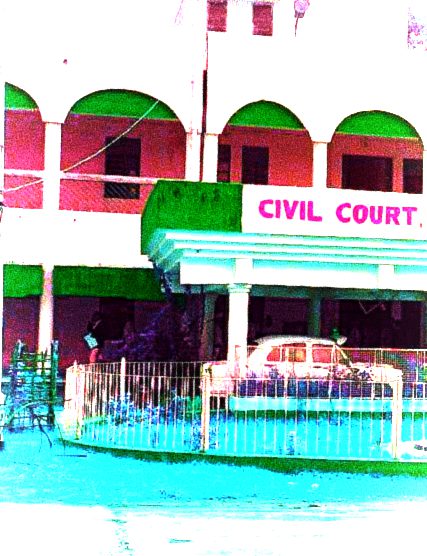In this article, Vishal Saini Have Discussed how to file cases in civil courts. before Proceeding to the article you need to know What is civil Case? , Four essentials of civil Suit? and How to File Cases in civil courts? if you want to skip this content (how to file a case in civil courts ) and directly Read here (How to file a case in civil courts )
What is a civil case?

A civil case settles disputes between two private parties, including individuals and organizations. A civil suit is basically a suit that is not criminal in nature. A suit is said to be of civil nature if it involves the determination of civil rights. Civil rights mean the rights and remedies vested in a citizen within the domain of private law as distinct from rights related to criminal or political matters and public law. As said in AIR 1995 SC 2001
Civil court cases involve conflicts between some people or institutions. Generally over money but it can be over rights, liabilities, or ways. Etc. Every suit begins with a cause of action and a civil suit is no exception to it. Civil suits begin when legal persons claim that/her rights have been harmed by the actions of another person or group of persons. A civil suit begins with the filling up of “PLAINT”
Four essentials of a civil suit.
Four essentials of the civil suit are as follows:-
- Parties
- Cause of Action for filling civil Suit
- Subject Matter of civil suit
- The relief claimed by Plaintiff ( meaning of plaintiff is the party who initiates a lawsuit before a court.)
All these essentials must be followed before a suit can be filled. A brief explanation is given below for your better understanding.
- Parties:- There must be 2 different parties to every suit namely a plaintiff and a defendant. There can be two or more plaintiffs and in the same manner, there can be 2 or more defendants but there must be at least one plaintiff and one defendant in every civil suit. The general rule regarding civil suit is the person interested shall be party thereto and the exception to this general rule is order 1 rule 8 of CPC it provides when there are numerous a person with the same interest with permission of the court. Sue or be sued.
- Cause of Action:- Bywords action means a suit. While “Cause of Action” means literally the cause of circumstances that leads up to a suit. A cause of action arises when the legal action of the party infringed
- Subject Mater:-Subject matter is basically property claimed in the suit that may be “movable” or “immovable”
- The relief was claimed by the plaintiff:-Every suit shall be instituted by presenting the plaint to a court or to any other officer appointed on behalf of the court. Usually, the suit is filed at the filling branch in a particular district. Every plant must contain relief also and the same rules also applied to the defendant if the defendant wants to claim counter relief he must claim in his/her separate written statement.
Most civil cases can be avoided if a person has the will. You can read about the importance of having a will in India
How to file a case in civil courts?

Filling a Civil case is complicated for every individual but I have explained in easy steps how to file a civil case in courts.
General Steps to file a case in civil courts:-
The general steps to file a case in civil courts are as below:-
- Jurisdiction:– You have to look out jurisdiction in which court you have to file a case. Since courts have jurisdiction over a defined area. So that you can have a basic idea of a place of suing. But you have to keep it in mind. What kind of suit is urs its for movable property, immovable property. ( Generally in the case of immovable property suit can be only instituted in the court within the
- The second step is to follow the Four essentials of a civil suit as told in the above para read here.
Easy Steps to file a case in civil court:-
Here is a simple and easy procedure, in brief, to file a case in Civil courts:-
A. Institution of Suit ( Order 4 rule 2):– Every suit is instituted by the presentation of plaint to the court or such officer prescribed by the court. When your advocate gets power of attorney to fight a case on your behalf he gets the authorization by his client to appear in a matter as per order 3 rule 4 and every plant shall be also presented in duplicate form.
Grounds of rejection of Civil Court Case:-
- The court may reject the plaint if it does not disclose a cause of action, or
- where the suit appears to be barred by the law of limitations.
- where the relief claimed is undervalued, and the valuation is not corrected by the plaintiff within the time fixed by the court;
- where the relief claimed, is properly valued, but the plaint is written upon paper that is insufficiently stamped, and the requisite stamp paper is not supplied by the plaintiff within the time fixed by the court.
- where the plaint is not presented in duplicate.
B. Summons to defendants ( Order 5):- The next step after the institution of the suit is a summons to the defendant to appear and answer the claim the defendant may be served in a manner prescribed and not beyond 30 days from the date of institution of the suit. (Section 27 of CPC). Summons includes the name of the court, purpose, Date and time of appearance, and Signature of a judge or another officer. and the Service of summons can be via WhatsApp and Email Also in the new era of technology.
C. Inspection of documents. ( Order 11 rule 15) :- Defendant has the right to inspect documents. Since the court has the responsibility of hearing both parties.
D. Written Statement ( defendant reply) Order 8:- After inspection of documents as in the above-said point defendant can submit his written statement and the defendant must specifically reply to the plaint each and every para. In the written statement the defendant can also make a setoff and counterclaim.
- Set off:- Means a claim set against another.
- Counter Claim:- A claim is made by the defendant in a suit against the plaintiff.
Then in between, there can be amendments to pleadings
If the respondent doesn’t reply to the written statement the court can strike off the defense of the defendant and decide the case Ex-Party After hearing the plaintiff only.
E. Documents and witnesses:– Then both parties can submit their documents/witnesses.
F. Hearing and Disposal:- After hearing both parties ( arguments, rebuttal, etc) and after following principles of natural justice the court came to conclusion regarding the case.
G. Judgement/Decree:- After all the above steps court came to the conclusion of judgment and decree and make decisions accordingly.
Suggestions:- You should take the help of a civil lawyer in this situation since they know how to follow this procedure of filing a case in court.
Read more:-
2. How to file a complaint against the police?
FAQs (Frequently Asked Questions)
- How much time case will take?
One can’t speak about the time taken by case it depends on how complex your case is.
2. How to file a complaint in consumer court?
Read here to know how to file a complaint in consumer court
3. How you can contact me?
You can contact me by visiting this page
4. How to file a case in criminal court?
Here is a simple and easy procedure to file a case in criminal courts:-
There are two ways.
A)File a complaint before the police then the police can register FIR and then forward that FIR to court
B) File a complaint directly to court.
To read more Click here
5. How to file a Case in Consumer court?
Here is a simple and easy procedure to file a case in consumer court:-
Basic requirements to file a complaint in consumer courts:-
- First of all, what you need to be is a consumer see at the top of the article I have explained who is a consumer.
- Then you need to have bills/proofs of defective goods or deficiencies in services.
- Then you need to inform the person who has provided you defected goods. ( better to inform them via advocate legal notice)
- If even after informing that supplier/shopkeeper he/she still chooses to ignore you then now you have the right to sue that person. In consumer court.
Click here to read more
Sources:- Used












